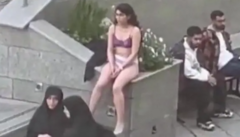
Iranian Authorities Decline to Charge Woman in Anti-Hijab Protest
An Iranian woman named Ahoo Daryaei will not face legal charges after an incident at a Tehran university where she stripped to her underwear in an apparent protest against compulsory hijab laws. The Iranian judiciary spokesperson, Asghar Jahangir, confirmed that no judicial case will be filed against her after she was treated in a hospital and returned to her family.
The incident occurred in November when a video went viral showing Daryaei being forcibly detained after an altercation with security agents over her refusal to wear a headscarf. Initially, Iranian authorities claimed she was “sick” and taken to a psychiatric ward, a tactic that has drawn criticism from activists who see it as a method of discrediting women’s rights protesters.
This approach of labeling women’s rights activists as mentally ill is not unprecedented. Azam Jangravi, an Iranian woman who fled to Canada in 2018, shared her experience of how the Iranian regime attempts to undermine protesters by questioning their mental health. She noted that some families, under pressure, might comply with such characterizations to protect their loved ones.
The incident highlights the ongoing tension surrounding Iran’s mandatory hijab laws, which were implemented following the 1979 Islamic Revolution. Women in Iran are required to cover their hair and dress modestly, with potential consequences for non-compliance.
The case echoes the broader context of recent protests in Iran, most notably those triggered by the death of Mahsa Amini in 2022. Amini, a Kurdish woman, died in police custody after being detained for allegedly not wearing her hijab “properly.” Her death sparked nationwide protests during which more than 500 people were reportedly killed.
Daryaei’s protest and subsequent treatment drew international condemnation, with organizations like Amnesty International calling for her immediate and unconditional release. The incident represents another moment in the ongoing struggle for women’s rights in Iran, where personal freedom of dress remains a contentious issue.
The student movement organization that initially published the video of Daryaei’s arrest reported that the incident began with an altercation over her headscarf, ultimately resulting in her undressing during the confrontation with security agents.
While Daryaei will not face charges, her case continues to draw attention to the broader issues of women’s rights and personal freedom in Iran. The incident serves as a reminder of the ongoing resistance against compulsory hijab laws and the challenges faced by women who challenge these restrictions.
The Iranian authorities’ decision not to pursue legal action in this instance may be seen as a subtle acknowledgment of the growing international and domestic pressure regarding women’s rights in the country.









